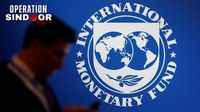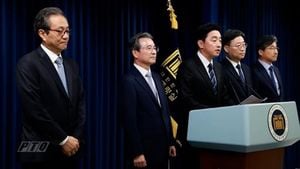In a significant development on May 8, 2025, India indicated it could voice its concerns regarding financial assistance to Pakistan at the upcoming International Monetary Fund (IMF) meeting in Washington. Foreign Secretary Vikram Misri stated during a media briefing that India's executive director at the IMF would present the country's position on the matter. This announcement comes a day before the crucial IMF board meeting scheduled for May 9, 2025.
Misri emphasized that the decisions made by the board are critical, suggesting that the issues surrounding Pakistan's repeated failures to effectively manage previous IMF aid should be evident to those countries that continue to provide financial support. "I'm sure that our executive director will put forward India's position," he said, highlighting India's firm stance on the matter.
The backdrop to India’s objections lies in Pakistan's troubled history with the IMF, having engaged in 24 loan programs since joining the organization in 1950. Misri pointed out that many of these programs have been suspended or abandoned due to Pakistan's inability to meet the agreed conditions. The most recent bailout, a $3 billion Stand-By Arrangement approved in July 2023, aimed to stabilize Pakistan's economy, which has faced severe challenges.
Pakistan's economic situation is dire, with inflation soaring to 17.3% as of April 2025. Additionally, its foreign exchange reserves are alarmingly low, estimated at $8 billion—enough to cover only 1.5 months of imports. These figures paint a concerning picture of Pakistan's economic management, further complicating India's position as it prepares to address the IMF.
The announcement of India’s stance comes on the heels of escalating tensions between the two nations. On May 7, 2025, India launched "Operation Sindoor," conducting military strikes against terrorist camps located in Pakistan and Pakistan-Occupied Kashmir (PoK). This military action was reportedly in response to a series of cross-border threats, including drone incursions from Pakistani territory. Indian defense forces claimed to have neutralized these threats, shooting down two Pakistani drones in the Naushera sector of Jammu & Kashmir.
This military escalation has intensified bilateral tensions, prompting both military and diplomatic channels to engage actively. Analysts suggest that India's challenge at the IMF is part of a broader geopolitical strategy aimed at applying economic pressure on Pakistan while reinforcing its commitment to combating terrorism.
The implications of these developments extend beyond immediate political concerns. Financial markets reacted negatively to the rising geopolitical tensions, with Indian equity indices experiencing significant declines. In the opening trade on May 9, the Sensex fell by 523.24 points (0.65%) to 79,811.57, while the Nifty 50 dropped by 189.85 points (0.78%) to 24,083.95. Investor sentiment remains cautious, with global risk aversion influencing market behavior.
Experts predict that the markets will continue to be sensitive to any further geopolitical developments, including the outcome of the IMF board meeting and its implications for financial aid to Pakistan. Traders are advised to adopt a level-based trading strategy in the short term, as the market appears largely non-directional amid the ongoing standoff.
Looking ahead, investors will closely monitor how long the current tensions might persist and whether they risk escalating into broader regional instability. The situation remains fluid, and the forthcoming IMF meeting could serve as a pivotal moment in shaping the economic landscape for Pakistan and its relationship with international financial institutions.
As India prepares to assert its position at the IMF, the world watches closely. The outcome of this meeting could have far-reaching consequences not only for Pakistan but also for the geopolitical dynamics of South Asia. With the stakes this high, the international community's response will likely play a crucial role in determining the future of economic assistance to Pakistan and the stability of the region.




